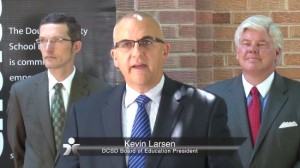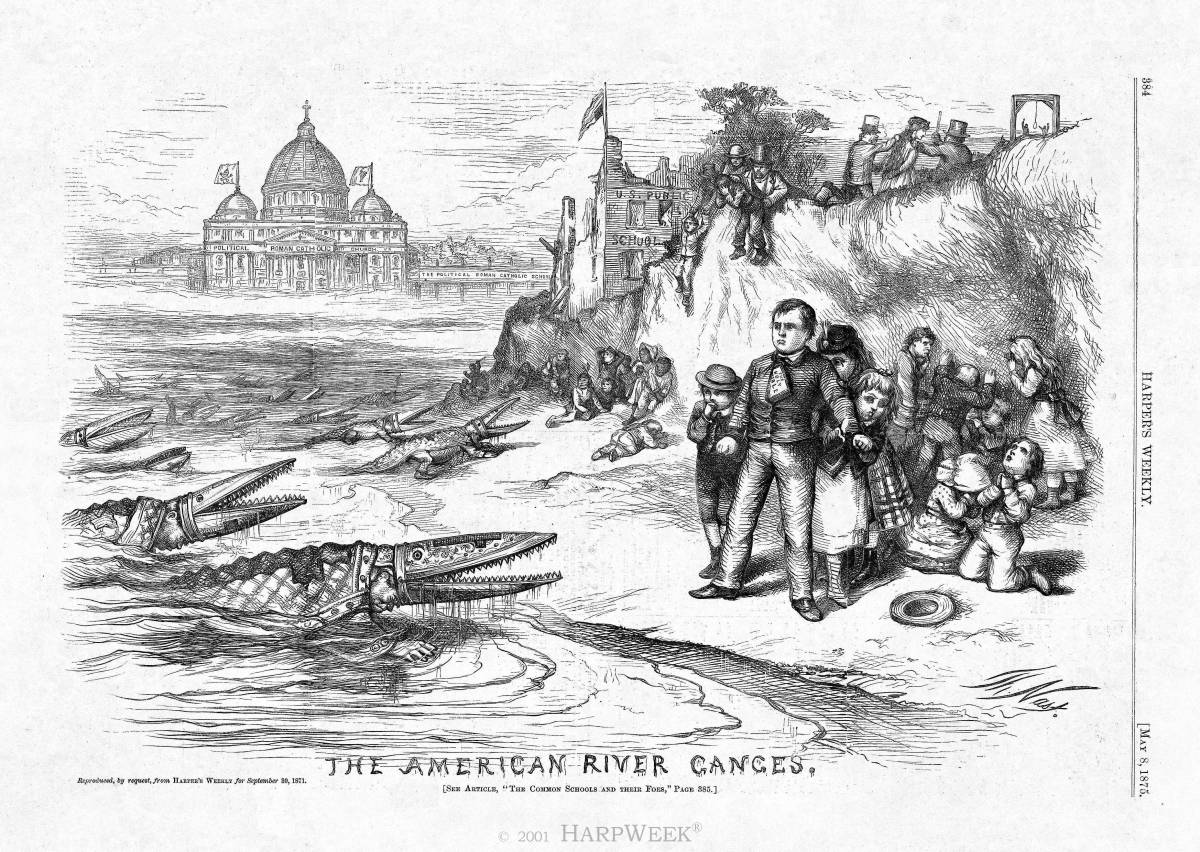Update (Nov. 2): Douglas County has filed its petition for the U.S. Supreme Court to hear the case.
A 19th-century constitutional provision, born during a period of anti-Catholic bias, has long threatened school choice programs in most states by banning state aid to religious organizations — including parochial schools.
Now, a small suburban Colorado school district is looking to fight its state’s so-called Blaine Amendment in the U.S. Supreme Court, arguing the provision leads to religious discrimination in a case that has the attention of school choice choice watchers all over the country.
The legal challenge might be a long shot. There’s no guarantee federal justices will even agree to hear Douglas County’s appeal of a Colorado supreme court ruling that struck down its voucher program.

But there are quirks in the Colorado case that some observers say give them one of the best shots they’ve had at their ultimate goal: Ending the use of Blaine Amendments to hamstring publicly supported private-school scholarships.
The case, which the district is expected to appeal before October 30th, could have widespread impact if it succeeds. Blaine amendments remain in force in 37 states, and they are being cited in lawsuits against school choice programs in Florida, Georgia, Oklahoma and Nevada.
In other words, supporters hope this summer’s court ruling, which cited Colorado’s Blaine Amendment to strike down the Douglas County voucher program, may prove to be a Pyrrhic victory for school choice opponents.
Religious freedom vs religious discrimination
At the heart of the matter is whether Blaine amendments can be used to prevent religious schools, and only religious schools, from participating in educational programs.

The U.S. Supreme Court could bar states from interpreting state amendments in ways that violate U.S. Constitutional rights.
Lawyers for Douglas County, along with lawyers representing scholarship parents, argue barring religious schools from voucher programs amounts to discrimination. They argue it violates parents and students rights under the First Amendment (freedom of religion) and the Fourteenth-Amendment (equal protection under the law) of the U.S. Constitution.
If the U.S. Supreme Court justices agree, their ruling could weaken Blaine Amendments as a weapon against school choice. First, though, the high court must agree to review the case, something lawyers for the parents aknowledge is rare.
Do vouchers “aid” students, or schools?
Colorado’s Blaine Amendment (Article IX Section 7 of the state constitution) prohibits financial aid to religious schools.
But supreme courts in Ohio, Indiana and Wisconsin, as well as the U.S. Supreme Court in Zelman v. Simmons-Harris, all viewed scholarships as aid to students rather than schools. Those legal precedents cleared the way for private school choice programs that didn’t single out particular religious groups.
“As long as parents were choosing schools and not the state, and as long as the state remained neutral with respect to the religious options, the links between church and state are severed,” Michael Bindas, a senior attorney with the Institute for Justice, said in an interview.
The Colorado Supreme Court even used similar reasoning to uphold scholarships to private religious colleges in Americans United v. State Fund Inc.
“The CSIG [Colorado Student Incentive Grant] Program providing funds to students attending institutions of higher education, which are neither pervasively sectarian nor theological, does not constitute a preference to any religious denomination or mode of worship and is not support of a religious sect or denomination…”
In their ruling earlier this year, however, Colorado justices held the Douglas County voucher program “awards public money to students who may then use that money to pay for religious education. In so doing, [the scholarship program] aids religious institutions.”
School choice supporters see an inconsistency.
In a recent interview with the Heartland Institute, Dick Komer, also a senior attorney with the Institute for Justice, said the court made a “series of specious distinctions” in order to permit scholarships for religious higher education but not religious K-12 education.
Discrimination against religious schools?

One such distinction is now considered discriminatory and illegal under Federal law.
Before 2008, Colorado’s scholarship program allowed private religious schools to accept state scholarships, but only if state bureaucrats determined the schools were not “pervasively religious.” This resulted in Roman Catholic and Methodist schools being approved while a Buddhist and a non-denominational Christian school were denied.
That system was upended, however, when the U.S. 10th Circuit Court of Appeals struck down Colorado’s “pervasively sectarian” restrictions in Colorado Christian v. Weaver.
“By giving scholarship money to students who attend sectarian – but not “pervasively” sectarian-universities,” the federal appeals court ruled, “Colorado necessarily and explicitly discriminates among religious institutions, extending scholarships to students at some religious institutions, but not those deemed too thoroughly ‘sectarian’ by governmental officials.”
By denying scholarships to students attending schools deemed “pervasively religious,” the 10th Circuit held, the government no longer provided equal treatment to people of all religions.
As a result, Colorado now allows all religious colleges to accept state-funded college scholarships.
Where things stand

Supporters of the Douglas County voucher program hope conflicting conclusions in Zelman, Colorado Christian and Americans United can help pique the U.S. Supreme Court’s interest in the case.
But their arguments could become relevant on the national stage when they contend the Colorado Supreme Court ruling, by prohibiting private religious K-12 schools from accepting vouchers, is on a collision course with the federal First and Fourteenth Amendments.
Lawyers for the Institute for Justice, which fights legal battles for school choice all over the country, said a favorable ruling could prevent state supreme courts from interpreting Blaine Amendments in ways that prohibit scholarships for students to attend private religious schools of their parents’ choice.
Is government remaining neutral by banning all religious institutions, or is it religious discrimination in violation of the First and Fourteenth Amendments to the U.S. Constitution?
“Singling out religious schools is not even handedness,” Bindas argues. “It is discrimination.”
He hopes that will soon be up to the U.S. Supreme Court to decide.


